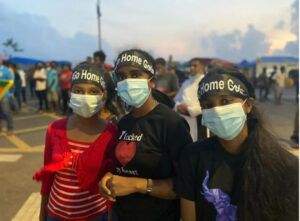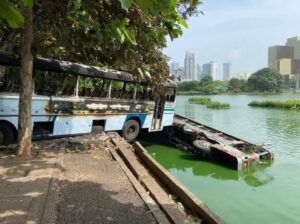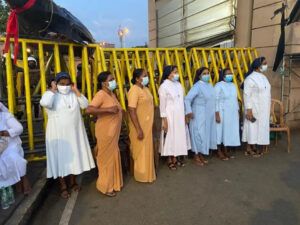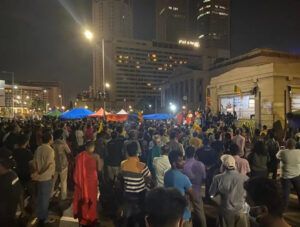Sri Lanka: Prime Minister resigns as counterrevolutionary attack sparks backlash
The original link of China Labor Forum: https://chinaworker.info/zh-hans/2022/05/19/32515/
Telegram link of China Labor Forum: https://t.me/chinaworkerISA
Twitter link of China Labour Forum: https://twitter.com/OctRevolution1 7
If you are interested in subscribing to "Socialist" magazine, please send an email to: chinaworker.isa@gmail.com
In the past 72 hours, something crazy has happened in Sri Lanka. This development, which could be called a revolutionary crisis, may well be a harbinger of similar upheavals in other countries.
Serge Jordan (International Socialist Road, ISA) reports from Colombo
(This article was first published on May 11, 2022)
Events in Sri Lanka have developed at a frantic pace over the past 72 hours. The situation has developed into a revolutionary crisis and is likely to be a harbinger of similar unrest in other countries.
On the morning of Monday 8th, hundreds of government-employed pro-Rajapaksa thugs and hooligans armed with wooden and iron sticks violently attacked two anti-government protest camps in the capital Colombo. They set out after a meeting with then-Prime Minister Mahinda Rajapaksa at his official residence in Burma House and attacked people who had been protesting for weeks in front of those residences, destroying their camp and entering The protest village "Gota Go Gama" (GGG) occupied area opposite the Presidential Palace Galle Face Green, one kilometer from the coast.

Built a month ago, the camp has become a symbol of resistance to political authority and a daily meeting point for all those who support the mass movement. Pro-government thugs unleashed extreme violence against protesters present, burning tents and banners and bloodily beating many. A large number of police officers were at the scene, most of them watching the fire from across the bank. A Tamil female witness said of the incident that "the police did not want to take any action", adding that she was a clear target because of her ethnic background and endured chauvinistic insults. "We lost a lot of personal belongings because they burned our tents, our clothes, our blankets, everything," said protesters who were there at the time of the attack. Dozens of protesters were seriously injured, and it was later reported that a youth Permanently paralyzed.
The Rajapaksa regime sees the move as a way to strike at the heart of the mass movement, intimidate peaceful protesters and scare them away - to pave the way for a broader counteroffensive to break up popular resistance. But it turned out to be a very serious misjudgment. After the attack, thousands of young people, with the help of passers-by, drivers and workers in the area who supported them and those who heard the news, began to drive the government-sponsored hooligans into the streets and teach them a lesson. Some were stripped and thrown into nearby Beira Lake or dumpsters; many buses used to transport the thugs to Colombo were set on fire, or pushed into the lake, or both. Lake Bella now presents a bizarre picture, with dozens of burned-out buses half-submerged in water.

Parts of the working class immediately took to the streets to protest the counter-revolutionary atrocities, including medical staff at Colombo General Hospital and lawyers outside the courthouse in Hulftsdorp. Postmen also decided to launch an island-wide strike in response.
On Monday afternoon, the government announced a curfew in an attempt to drive people off the streets. Since then, the government has carried out a large-scale military deployment in the capital and other parts of Sri Lanka. In order to fight the curfew, anti-government protesters have begun to re-engage in the Galle Face green movement. By 4 p.m., the protest village had been reborn from the rubble, tents had been rebuilt, and more people from different corners of the city had joined the movement to show their solidarity by defending the camp, including Catholic nuns who had been watching through the night to protect the area.

Mahinda's plan backfired completely, and he formally stepped down in the ensuing hours. Firecrackers were set off on the outskirts of Colombo as local residents celebrated the news by cooking Kiribash (milk rice, a traditional Sri Lankan dish).
After Chamar Rajapaksa, Namar Rajapaksa and Basil Rajapaksa, who all stepped down from cabinet positions in mid-April, Mahinda is the latest in the Rajapaksa family. downfall members. He led the massacre of tens of thousands of Tamil civilians during the civil war and was therefore hated by the Tamil community. After his resignation, however, calls for the resignation of his brother, the equally odious President Gotabaya Rajapaksa, soared across the country. So far, the regime's faltering between compromise and violent repression has not stopped the revolutionary struggles waged by Sri Lankan workers, young people and the poor.
Emboldened by the prime minister's resignation and resented by the vicious attack on the regime, people across Colombo and many other parts of Sri Lanka have staged protests. Crowds burned villas, mansions and other properties of the Rajapaksa family, senior members of the ruling Sri Lanka People's Party and members of Congress. More than 50 houses of politicians were reported to have burned down overnight, and many more were attacked and set on fire on Tuesday.
As I drove into Colombo on Tuesday afternoon, one of the large mansions caught fire and hundreds protested outside, marked "Gota Go Home" in red letters on the front. In Sri Lanka's southernmost town of Tangalle, angry protesters tore down a statue of DA Rajapaksa, the father of the Rajapaksa brothers. As for Mahinda, after being surrounded by hundreds of protesters, he had to be evacuated from his residence and flown by military helicopter to the Tamil-populated northeast. Subsequently, it was reported that Mahinda took refuge at the Trincomalee naval base, triggering protests in front of the base. The naval base was used by the Rajapaksa regime as a concentration camp for Tamils during the civil war.
At least eight people have been killed and hundreds injured in the latest clashes. The clashes between pro-government and anti-government protesters on the streets of Colombo were described by most international media as "riots" and "acts of violence", with Western governments and embassies urging "restraint". But the answers to the questions of who committed the violence and who brutally attacked those completely peaceful and unarmed protesters, including families with infants and young children, should be self-evident.
What happened next can be said to be a model for the outbreak of revolution caused by the "whip of counter-revolution". With millions of Sri Lankans facing severe economic problems, including massive shortages of fuel, gas and medicines, prolonged power outages and soaring prices for food and other necessities, the attack has sparked an underclass of people living in luxury. It is not surprising that people reacted with anger.
It is also surprising that youth violence is not indiscriminate. From what we were able to see, not a single bus stop, small shop or ordinary people's property was damaged in the incident. Anger is the symbol and wealth of oppressive and corrupt regimes, and the thugs who perpetrate violence on their behalf.

the struggle continues
From dawn on Tuesday, as rumours spread that regime cronies and loyalists were trying to flee the country - including the former prime minister's second son and chief of staff fleeing to Australia the day before - thousands of revolutionary protesters began to gather in On the road to Bandaranaike International Airport. They were mostly young, many of them women, many wearing helmets and armed with clubs in self-defense. They organized checkpoints on main roads, patrolled the streets and searched every car to make sure the corrupt cabal that brought the country to its knees was responsible for its crimes. Some of those soldiers stationed there spoke to the protesters, who were watching it all calmly. On May 11, as this article was written, the area around the airport appeared to be still under the control of the People's Patrol.
At the same time, however, the government has also issued a "shoot-in-place" order for anyone who damages public property, causes harm to life or violates the curfew. Previously, through the state of emergency declared last week, the national army had been given the power to arbitrarily arrest and detain. Tens of thousands of heavily armed troops have assembled in Colombo since Monday, with barracks set up everywhere, creating the atmosphere of a city under military siege - similar to what Tamils still experience every day in the north and east of the country Case. Streets in central Colombo are largely deserted today, with shops, restaurants and offices closed, the result of an extended curfew and ongoing strike action by many public and private unions.
A volatile and precarious stalemate remains. The masses had won an important victory in their revolt, and deep in everyone's mind was a poignant determination to keep fighting until Gotabaya stepped down. However, the threat from more counterrevolutionary violence or broader state repression is far from gone.
At the time of writing, the army has warned the protesting village occupiers to evacuate. The state could attack the camp at any time. The mass movement needs to be fully prepared for a new wave of revenge attempts by the regime. The patrols by protesters in some areas of Colombo, especially around the airport, are a very encouraging step in that direction. They need to be more organised and broader to protect all protests, workplaces and communities from further attacks by pro-regime mobs and military police, and to ensure that control of the streets does not remain in the hands of the state apparatus - although some military members There seems to be sympathy for the movement, but the army is still controlled by the brutal butchers who have committed genocide against the Tamils. The striking workers and unions should give their full support to the protection of the protest village and urgently send representatives there to help organize the defense.
The masses should also actively resist the danger of communal violence. In recent days, pro-regime elements have been inciting divisions; especially in the western city of Negombo, Sinhalese Buddhist chauvinists have tried to spread hate speech to stoke hostility against the Muslim minority.
Mass uprisings bring unity to different parts of society in a way that was hard to imagine until recently. The fight has spawned heartwarming scenes, such as last week's Sinhalese protesters inviting a Jaffna University student activist to deliver a Thai speech to a predominantly Sinhalese audience during the student-led blockade of Colombo's Parliament Road last week. Speak in Mir. In the protest village, a Sinhalese activist who was a victim of the May 9 attack humbly explained to me: “Now we have seen what the regime will do to us, and we understand better What our Tamil brothers and sisters have been through in the past."
Having said that, the scars of the past are clearly not fully healed, and in fact the movement is currently more active in the Sinhalese-majority areas of the south. While many Tamils support the movement, they also have reason to worry about their demands for justice and reparations, fair trials for the perpetrators of mass disappearances, killings and rapes during the war, and the fundamental right of Tamils to determine the future, possibly would be marginalized in the post-Rajapaksa political landscape. Thus, the movement will gain more power by actively calling for equal rights for all minorities and for the Tamils' unconditional right to national self-determination - including the right to secession and independent statehood.
Launch a general strike to overthrow the regime!
Various workers and trade union movements play a key role in ensuring that the struggle retains its mass, order and unity. The solidarity and strength shown by all segments of the working class is a defining feature of this struggle: from construction workers pushing pro-government buses down the street with excavators, to airport immigration officials joining hands to pledge not to let any MP or minister pass ; from lawyers mobilizing for the release of young protesters arrested by the police, to medical workers helping the wounded after protesting village occupation attacks.
Last Friday, 6 May, the Confederation of Trade Unions called for a general strike, a historic show of force staunchly embraced by the entire Sri Lankan working class, crippling the island's economy and shaking the country's entire system and bourgeoisie. Worker strikes in EPZs cost large industrial manufacturers $22 million in one day! After that success, unions have called for a week of protests and a new, general strike, starting Wednesday (May 11), for the president to step down. From the perspective of union leaders, this is a threat, not a plan they are committed to fully realizing. But Monday's pro-government mob attack and Mahinda's resignation both accelerated and disrupted their plans; nationwide strike action effectively began Tuesday in multiple sectors, such as administrative service employees, railroad workers, university teachers, health professionals; but Some union leaders have also called off strike calls because of recent events.
Industry workers such as ports and power also joined in on Wednesday. But strikes should be extended to all workplaces, and unions should picket, explicitly call for mass street rallies, and speak out against curfews. The current situation calls for an effective general strike until Gotabaya, his coterie and the government are overthrown - a goal that should be set by workers and all segments of the people fighting against the rotten regime, regardless of union leadership Half-hearted.
However, in order to achieve real change, the masses must deepen and expand their demands beyond the popular slogan of "Gotabaya go home" to overthrow the incumbent president - who is only a puppet of the entire system of economic exploitation, imperialist blackmail and national oppression. The masses must reject any negotiation with the International Monetary Fund, lest these international financial institutions lure Sri Lanka into a vicious debt trap, take precious resources away from the populace, and use it to extort the broad masses of the people and impose new austerity measures, Deteriorating the living conditions of the majority and further subjecting Sri Lanka to international creditors.
They must ensure that not only the huge wealth plundered by the Rajapaksa family is returned to the people, but that the country's main resources and means of production and distribution are controlled by the public under the democratic control of the working class, restructured and planned according to the needs of all Sri Lankans economy.
The masses must resist any undemocratic transition, whether by the top military or, more likely, by a new group of unelected politicians appointed by the top; these people will maintain the existing system and prevent the masses from resisting. In fact, as this article is about to be completed, President Gotabaya has just given a public address to the nation that he will appoint a new cabinet this week and move a constitutional amendment to set out the content of the 19th Amendment to the Constitution , giving more powers to the parliament and making way for the abolition of the executive presidential system after "national stability". Undoubtedly, this was one of his numerous attempts to maintain control of power, the last and most important insurance mechanism that the Rajapaksa dynasty took to avoid political collapse.
Faced with these relentless movements, workers, youth, poor peasants and revolutionary masses need to organically form a real alternative through their own independent political organizations - not relying on the imperial opposition, whose economic agenda will still be It has led to hell for millions of Sri Lankans.
Many protesters I've spoken to have expressed skepticism, if not yet completely disdainful of these royal opposition. Sajith Premadasa, the opposition leader from the right-wing and pro-business "United People Power" (Samagi Jana Balawegaya), is campaigning to be the next prime minister, and was even attacked there at Galle Face Green. After being attacked by protesters, he had to be escorted from the protest site by his security guards. The People's Liberation Front (Janatha Vimukthi Peramuna) has limited itself to political demands for the government's resignation, but has remained largely silent on the economic issues that overwhelm the Sri Lankan people.
In order to achieve radical systemic change and address the dire situation experienced by millions of people in Sri Lanka, ISA advocates:
- Go all out for a general strike and bring down the Gotabaya and the entire Rajapaksa ruling family! Immediately ban all regime cronies from going abroad - return stolen assets and confiscate all their property and wealth;
- End the state of emergency, stop militarization and demand the withdrawal of troops from the streets;
- The abolition of the Executive President and the current Constitution and the establishment of a Revolutionary Constituent Assembly with full free elections in all areas of the island;
- Establish action and self-defense committees in all workplaces, protest sites, communities and villages;
- Not negotiating with the International Monetary Fund, refusing to take more austerity measures, and unconditionally canceling the national debt;
- Implement price controls and substantially increase wages in all sectors of the economy;
- Public monopoly of all foreign trade, nationalization of major industries, land and banks, and placed under the democratic control of the workers. Implement a socialist economy with democratic planning by the working people and peasants and a government composed of representatives elected by them;
- against ethnic divisions and in support of a united movement of all workers, the poor and the oppressed;
- Defend Tamils' right to self-determination, including their right to independent statehood. Provide adequate justice and reparations to the victims of the war and return all occupied lands. Trial war criminals in a people's court - revealing the full truth about killings and enforced disappearances;
- International solidarity with the mass uprising in Sri Lanka.
Like my work? Don't forget to support and clap, let me know that you are with me on the road of creation. Keep this enthusiasm together!

- Author
- More